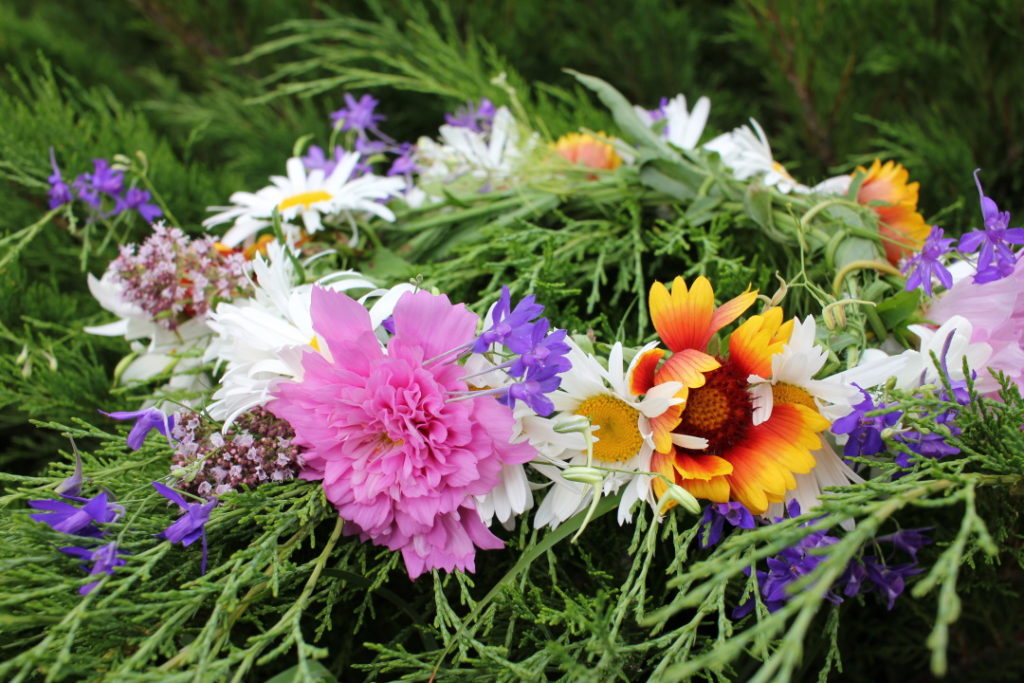With the arrival of the solstice, and the longest day of the year, earlier this week, we in the northern hemisphere are in both meteorological and astronomical summer. The days are sun-drenched and warm – if not hot. The evenings linger past eight ‘o’clock. Many of us even experience renewed energy, as if, like the bright yellow flowers we see growing along highways and in back yards, we are stretching skyward toward the light and the warmth.

And yet, the summer solstice is also a time for reflection. For me, this time of year is not as much about expansion as about pulling back and looking inward. (My birthday comes at the end of summer, and that is when my energy is at it’s rawest and most vibrant.)
Balmy summer afternoons seem made for these quieter pursuits, a twist on the traditional siesta of the Latin world. I have strong memories of sharing the front porch with my grandmother on summer days, each of us with a glass of iced tea and a book, magazine, or crossword puzzle. I remember the feel of the condensation cooling my hand when I gripped my glass, and I remember the soft background noises that were ever present: cicadas, lawn sprinklers, small children playing, the occasional barking dog.
But I also remember that, as she got older, my grandmother grew to dread those long summer afternoons – especially Sunday afternoons. Part of this was just the life of an empty nester. Without young children in her home, she and my grandfather were disconnected from the daily events so often tied to the school year, and no longer lived by its rhythm.
Another factor was sundowner’s syndrome. Sundowning is something that happens to Alzheimer’s and dementia patients as they age. As the light around them wanes, especially in the summer, when twilight lasts for hours, older folks can get antsy, agitated, and confused. The change in light that comes with the longest summer days is especially confusing because those in care may find themselves going to bed while it is still light out, which also disrupts their sense of time. (Children may be similarly distressed by this.)
As caregivers, the solstice teaches us to find balance. We must find the time to enjoy the bright sun, and soak up all that free vitamin D, while still attending to the needs of the people we care for. We must take time for ourselves and use the days wisely, engaging in beloved summer experiences, without neglecting those we take care of who may not be able to experience them with us.
For me, balance was found in the quiet spaces. I could acknowledge my grandmother’s apprehension, staying longer on the porch with her, and finding articles about things she loved, but also taking time for myself, even if it was just sitting on the back stoop with a wedge of watermelon.
The summer solstice is a powerful time that often brings renewed energy, but it’s also a time to pay attention to those we love and find ways to meet their needs without neglecting our own. One of the last summers I spent with my grandmother found her unable to travel to her beloved beach, so we brought the beach to her.
My mother and I went out early and collected buckets of sand and sea water and brought it home along with a small kiddie pool. We poured the sand into one side of the pool, and added water to create a space where she could either rest her feet on sand or dip her toes in the ‘surf.’ We even made sure there were a few shells for her to find – she collected seashells, and now all of us do too.
My own solstice tradition involves dipping my own feet in the ocean, when I can, or soaking in a bubble bath when the beach is too far away. Last weekend, I ate fresh fish while I watched a summer squall build over the salt marsh that leads to the Gulf.
In the back of my head, I saw my grandmother’s gentle smile, and knew, somehow, that she approved.
“Summer afternoon—summer afternoon; to me those have always been the two most beautiful words in the English language.” — Henry James
